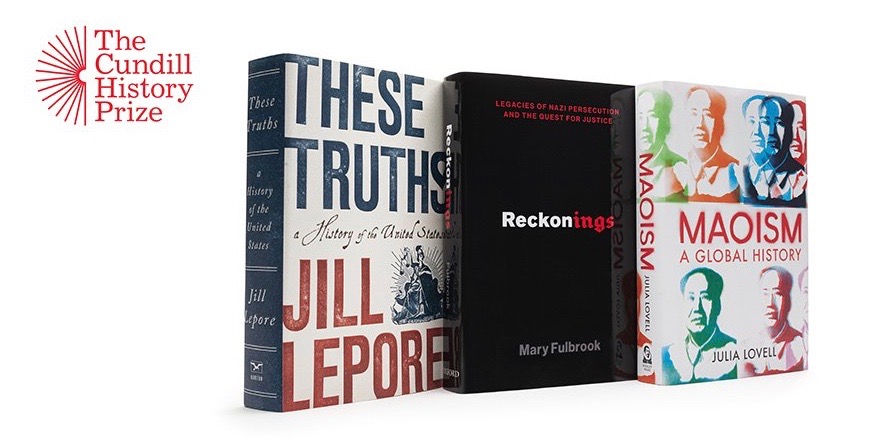
Three finalists for the 2019 Cundill History Prize were announced last night at an event at Massey College, Toronto. The finalists, all female, are UCL Professor of German History, Mary Fulbrook; Harvard Professor and New Yorker staff writer, Jill Lepore; and Julia Lovell, Professor of Modern China at Birkbeck College at the University of London. These three extraordinary authors approach difficult subjects, opening sometimes uncomfortable conversations around the past to help us better understand their repercussions today.
The three historians will be awarded US$10,000 each, and are now vying for the grand prize of US$75,000, the largest prize for a work of non-fiction in English.
The three finalists include:
- Reckonings: Legacies of Nazi Persecution and the Quest for Justice, by Mary Fullbrook
Reckonings explores the lives of both the victims and the perpetrators of the Holocaust. Fulbrook provides an in-depth look, not only at the Holocaust, but at the consequences of its violence which reverberate today. - These Truths: A History of the United States, by Jill Lepore
Lepore delivers an ambitious one-volume history of the United States that takes the reader from as far back as 1492, right up to the election of its current president, Donald Trump. Lepore places truth itself along with a devotion to facts, proof and evidence, right at the center of the nation’s history. Lepore describes how the American Experiment rests on the ‘truths’ of political equality, natural rights, and the sovereignty of people, among others. - Maoism: A Global History, by Julia Lovell
This title comes at a time when political tensions between China and the West are on the rise, and offers readers an opportunity to understand the political legacy of Maoism. Lovell re-evaluates Maoism as a significant global force, arguing that it should not be so easily dismissed. Lovell demonstrates Maoism’s tremendous influence on historical events, from the Cold War and the Vietnam War, all the way to anti-colonial resistance movements in Africa.
“Exceptional works of history”
Two-time Pulitzer Prize-winning historian Alan Taylor, Chair of the Jury, shared insights on the three outstanding books in contention for the 2019 Cundill History Prize to an audience of publishers, academics and book lovers during this exclusive event at Massey College.
“The finalists for the Cundill History Prize have written three exceptional works of history,” said Taylor. “Fulbrook’s Reckonings, Lepore’s These Truths, and Lovell’s Maoism are deeply researched and rich in insights. They take on difficult and ambitious topics with an impressive commitment to moral inquiry and humane values. Their literary quality will enable the authors to introduce new findings to a very broad readership.”
Following the announcement, Taylor joined Robert Bothwell, May Gluskin Chair in Canadian History at the University of Toronto, for a conversation titled Canada and the United States: The Past of the Present. Chaired by Antonia Maioni, Dean of the Faculty of Arts at McGill, the conversation considered how we relate across a constructed, yet very real, border. The three speakers discussed how politics in Canada and the United States have met and diverged through history, and what this means for our current political moment.
Cundill Prize alumni: Growing list of world-class historians
On November 14, the winner will be revealed at the Cundill History Prize Gala at the Montreal Museum of Fine Arts. The three finalists will be joining last year’s winner, Professor Maya Jasanoff, author of The Dawn Watch: Joseph Conrad in a Global World, for a panel discussion on history-writing in the age of fake news. The newly coined Cundill Forum will take place on Thursday November 14 and will be open to the public and the McGill community.
The 2019 winner will join an exceptional alumni list of world-class historians: Maya Jasanoff (2018), Daniel Beer (2017), Thomas W. Laqueur (2016), Susan Pedersen (2015), Gary Bass (2014), Anne Applebaum (2013), Stephen Platt (2012), Sergio Luzzatto (2011), Diarmaid MacCulloch (2010), Lisa Jardine (2009), Stuart B. Schwartz (2008).
